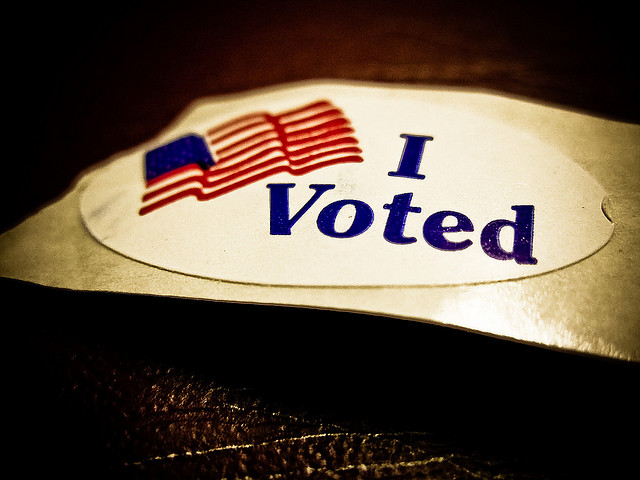On this Election Day, I am pondering how much America is changing and how much it is changing me. The earliest recollection I have of the political process is the 1992 election in which Ross Perot ran for president. I was 6 years old. This was long before I had an overwhelming cultural awareness, and certainly before I spoke Spanish. Twenty years ago, this country was not plagued with worry about how well the government would represent Latinos, and hearing a Spanish campaign ad was as rare as finding a decent Spanish radio station. Although I knew a few Latinos at the time, I never could’ve imagined the impact this demographic would have on the future of the country, and on my own life.
As someone who studied political science in college, I like to delve into the grand symbolism of each candidate’s ideology and why masses of people can be corralled into a two-party system. I see voting as a civic duty that we have to perform in order to take advantage of government services in exchange, not necessarily as something personally meaningful.
However, this election is the first that has made me look around and realize what a large stake some people put in their right to vote in America. I remember that I have never lived in a country in which this kind of participation is impossible. I have never lived in, for example, any part of Latin America that has been ravaged by civil war and ruled by militant means. My memories are of my parents watching the news, discussing amendments, and taking me along to the polls. Not exactly a gut-wrenching argument for the importance of the democratic process… at least not in the way that a dangerous political past can be. I realize that a lot of the people standing in line beside me — immigrants in particular — are there because they are moved by more than just a sense of duty.
My daily exposure to so many people who were not born in this country is shifting my view. I’m starting to understand, if slowly, why voting is not just a responsibility. I do experience something almost magical standing in line (sometimes for hours) with other average people who are all empowered by the feeling of bubbling in a ballot. Maybe this is the most powerful thing I’ll ever feel about my right to vote, since I can’t generate memories of a home in which this isn’t possible. I wouldn’t volunteer to switch places with someone who lives under a despotic government, but I am grateful for the opportunity to live vicariously through each person who has an even more sentimental connection to America than I, a native American, do.
As I watch white Americans like myself become the minority in the near future, I hope I can remember — even if it’s only once every four years — that America means different things to different people, but all of those things are equally relevant.
{Photo by Vox Efx}



Re: “Twenty years ago, this country was not plagued with worry about how well the government would represent Latinos, and hearing a Spanish campaign ad was as rare as finding a decent Spanish radio station.”
Those things have been common n the Southwest for the last 50 years, at least.
http://www.youtube.com/watch?v=c2tQRfyucKY&feature=player_detailpage
Karen,
Allow me to clarify. Certainly, candidates have been concerned about gaining the vote of the Spanish-speaking population for quite some time. However, this demographic has never been as large as it is today. What I meant by “plagued with worry” was more from the voters’ perspective rather than the candidates’. Because they are such a large, diverse group, Latinos worry now more than ever that a government historically run by white males will not represent them. I agree that the Southwest has always been a politically contentious region due to its proximity to the Mexican border, but that contention has now spread throughout the whole U.S. Just look at the rapid growth of the Hispanic population in the past decade: http://pewresearch.org/pubs/1940/hispanic-united-states-population-growth-2010-census
I don’t worry that a governent run by white males will not represent me, but that a government run by racist extremists will not represent me. There have been many white men who have fought for the rights of all Americans, such as Ted Kennedy, LBJ, Bill Clinton, Earl Warren, etc. And the Southwest hasn’t always been politically contentious. That’s only happened in the last 20 years, since Prop 187, but there has always been racism. The anti-immigrant backlash really began when Mexican-American voters flipped California from red to blue in 1992.
When I said that “those things have been common for the last 50 years,” I was referring to candidates vying for Mexican-American votes. it’s been happening since JFK. It’s not really new. It happens across the country now, and with non-Mexican Latinos as well.
Thanks for sharing this timely and very interesting post with us, Chelsea! You’re totally right, for many Latinos, having their vote be counted is a great departure from what they’ve historically been used to in their countries of origin.
For more on how the Latinos — and a lot of other groups — are changing the face of America, this is a must read article: http://www.huffingtonpost.com/2012/11/06/barack-obama-reelection_n_2085819.html?utm_hp_ref=latino-voices&ir=Latino%20Voices